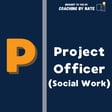
The Airline Safety Guardian (Not in the Air!)
A-Z Jobs Podcast: The Airline Safety Guardian (Not in the Air!)
Ever wondered who makes sure your flight is safe before you even board? In this episode, host Nate is joined by Grant, an Air Safety and Compliance Manager with over 30 years in aviation.
We go behind the scenes of this high-responsibility career, exploring:
✈️ His Start: From a Saturday airport job and carrying bags for a future President to his time in the stressful world of air traffic control.
🛡️ The Real Job: What a Safety & Compliance Manager actually does—and why it involves so much more than just rules.
💬 Mastering Difficult Conversations: Learn the crucial skill of giving constructive feedback without making it feel like criticism, a lesson applicable to any career.
🚀 Career Fast-Tracking: Grant’s actionable advice on using shadowing, mentoring, and building relationships to accelerate your own career in any industry, especially aviation.
If you’re fascinated by high-stakes professions, love a good "how it works" story, or want to learn how to build a career through connection, this episode is for you. Grant’s story proves that sometimes the most critical roles in aviation aren't in the air, but on the ground ensuring everyone's safety.
#AZJobsPodcast #AviationCareers #SafetyAndCompliance #AirTrafficControl #CareerProfiles #JobSpotlight



















